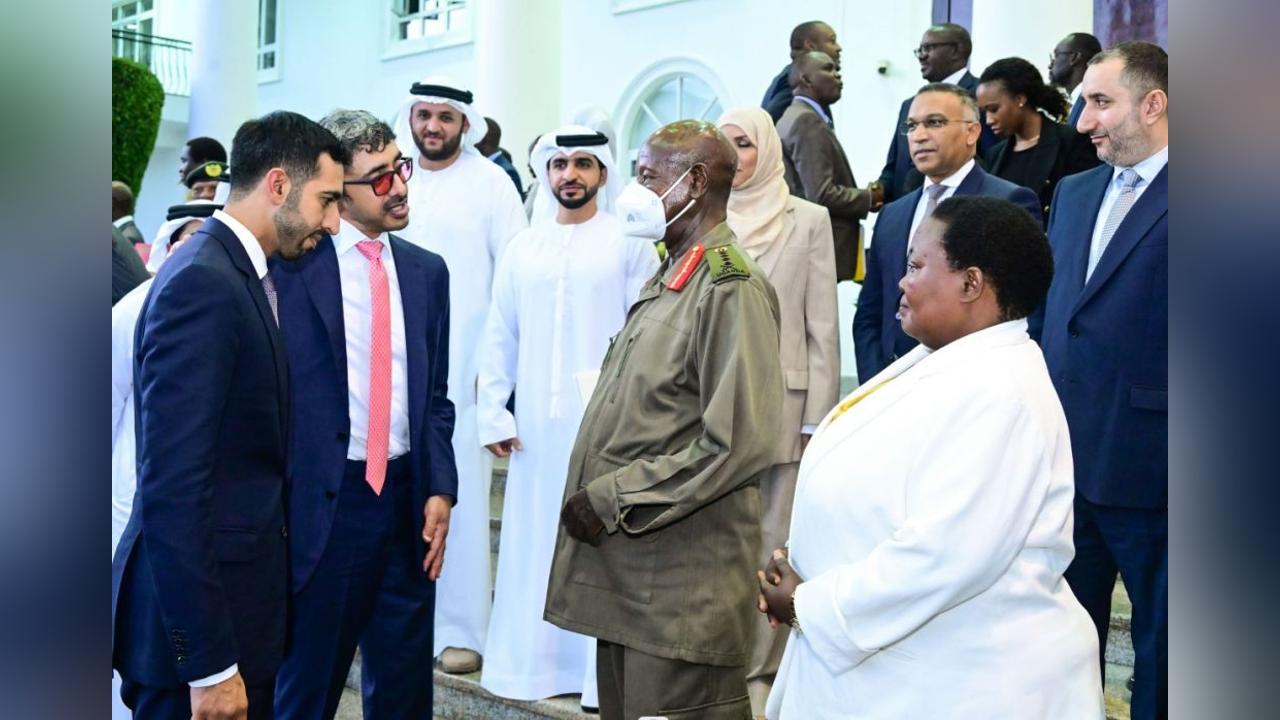By Faridah N Kulumba
Africa-Press – Uganda. The president of the Republic of Uganda Yoweri Kaguta Museveni recently held a meeting with a prominent investor from Qatar, Mr. Khalid bin Mohammad Al Attiyah also a former Deputy Prime Minister of Qatar to discuss investment cooperation between the two nations. The engagement took place on 11th May at State Lodge in Kampala.
proposed key sectors of cooperation
The meeting centred around deepening bilateral investment cooperation, with a focus on key sectors including petroleum supply infrastructure, mining and agriculture. President Museveni took the opportunity of the meeting to present proposals aimed at value addition in Uganda’s agricultural sector, particularly in coffee and fruit processing, to enhance export competitiveness. Museveni also proposed collaboration in the mining sector, specifically in the processing of lithium, a strategic mineral necessary for clean energy technology. He further extended an invitation for partnership in the manufacture of electric vehicle batteries, positioning Uganda as a key player in the global green energy transition. “Uganda has the raw materials and with the right partnerships, we can add value locally and build an industrial base that serves both regional and international markets,” said President Museveni.
Why these sectors need investors
Mining: The mining industry of Uganda is growing, with potential for significant economic transformation. It’s a sector rich in diverse minerals, including gold, uranium, and various industrial and construction materials. The government is focusing on attracting investment and improving regulations to promote sustainable practices, recognizing the industry’s potential for poverty reduction and job creation.
Mining is still a relatively small portion of the overall economy, the sector is growing, with recent contributions to GDP ranging from 1.9 percent to 2.2 percent. The commercially viable minerals include gold, iron ore, copper, cobalt, uranium, limestone, marble, phosphates, and graphite.Petroleum: Uganda’s oil and gas sector is poised for significant development, with the country estimated to have 6.5 billion barrels of oil reserves, including 1.4 billion barrels considered economically recoverable. The sector is being driven by major projects like the East African Crude Oil Pipeline (EACOP), the Tilenga and Kingfisher oil projects, and a planned refinery. These projects are expected to contribute to Uganda’s economic growth, job creation, and energy security.Agriculture: For centuries the agricultural sector has been the backbone of Uganda. Uganda has a friendly environment with low temperature and fertile soils, variability due to the two rainy seasons which is attributed to the country being at the equator.
According to the United Nations Food and Agriculture Organization (UNFAO), Uganda’s fertile agricultural land has the potential to feed 200 million people. Eighty percent of Ugandan’s land is available but only 35 percent is being cultivated. In the fiscal year (FY) 2020/2021. agriculture accounted for about 23.7 percent of the country’s gross domestic product (GDP), and 31 percent of export earnings. And in FY 2021/22, agriculture accounted for about 24.1% of GDP and 33 percent of export earnings. Uganda’s agriculture sector has so many investment opportunities for anyone who wishes to invest in it, including in production, input supply, value-added processing, standards compliance and export, and post-harvest handling. Infrastructure: The country’s infrastructure sector is facing challenges especially in transport and housing, but the country is actively investing in development. Key areas of focus include roads, airports, energy, and Information Communication Technology (ICT). Road infrastructure is particularly overburdened, especially in urban areas, and there’s a need for upgrades and maintenance. The government is also working on expanding air travel with projects like the Entebbe International Airport expansion and the development of Kabale International Airport
Uganda and Qatar cooperations
In the past years Qatar and the Republic of Uganda signed several Memorandums of Understanding (MoU) aiming to enhance bilateral cooperation in several fields, including a cooperation agreement in the field of defence; a cooperation agreement on encouraging and protecting mutual investments; an agreement on economic, trade, and technical cooperation, and an MoU on cooperating in the field of agriculture. In 2017, Uganda and Qatar reviewed bilateral relations and means of enhancing them in all fields, especially in the fields of defence, politics, economy, investment, and agriculture. In April 2024, the governments of the State of Qatar and Uganda inked an agreement to enhance joint cooperation in the fields of labour and organize labour recruitment from the Republic of Uganda. It aimed to enhance the strategy of the Ministry of Labor in attracting skilled and qualified labour and bolstering their presence in the local market, improving the productivity of the private sector, and upgrading the work environment. According to the agreement, the two p governments agreed to facilitate the procedures for recruiting skilled labour from the Republic of Uganda and supply the local market with the required competencies, qualifications, experiences, and specializations. Both parties also agreed to review job opportunities available in the State of Qatar and the skills and experiences required, and their availability in Uganda. The Uganda-Qatar Bilateral Labour Agreement is a significant stride towards safeguarding the rights and welfare of migrant workers. It embodies a shared responsibility towards humanity’s most vulnerable and sets a commendable standard for international labour agreements. As we celebrate this progress, it’s crucial to remain vigilant, ensuring that such agreements are not just ceremonial but catalysts for real and lasting change. This agreement is not just a beacon of hope for Ugandan workers; it’s a call to action for nations worldwide to reevaluate and improve their labour practices in favour of human dignity and rights
High expectations
During the recent meeting, Mr. Khalid, expressed strong interest in the proposed areas and affirmed Qatar’s commitment to exploring mutually beneficial ventures with Uganda. This engagement is a significant step forward in strengthening Uganda-Qatar economic relations and supporting Uganda’s drive for industrialization and sustainable development.President Museveni assured that Uganda is ready to strengthen ties with Qatar investors in order to modernize and expand the critical sectors for national development.
For More News And Analysis About Uganda Follow Africa-Press






